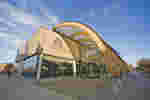Faculty of Arts, Social Sciences and Education
Explore world-leading research, modern facilities, and pioneering courses in Arts, Social Sciences & Education at the University of Hull.

Welcome from the Dean
As a ‘first in family’ graduate, I understand the impact that higher education can have on the aspirations, career decisions and overall life trajectories of individuals.
I am proud to lead a Faculty which is committed to shaping better futures for its community members and to providing a place to foster meaningful collaboration which makes change happen.
Our Faculty is a vibrant hub of learning, creativity, and critical thinking, where we explore the complexities of human society, culture, and education. The work we do has meaningful impact which is globally relevant and makes the world a better place to be.
Professor Darren Mundy
Executive Dean of Faculty of Arts, Social Sciences and Education
Schools and disciplines
Hull is a pioneer in the arts, social sciences and education. Our Schools have a proud heritage of academic excellence and groundbreaking research, and are home to a multidisciplinary community of academics, researchers and practitioners.
Research
Research in our Faculty is truly diverse. Tackling outward-facing challenges, our research spans across the areas of society, culture, and education, helping to drive a fairer and brighter future for all.
From examining historical and modern forms of slavery, to crime and violence prevention, we’re working with communities and partners to tackle injustice head on. Our research into law, politics and ethics uncovers how decisions are made and how we view and influence issues of social justice. While our work in arts and performance explores our relationships with culture and the transformative power of arts in our communities.
Learn more about our research and our interdisciplinary centres and institutes here:
Facilities
